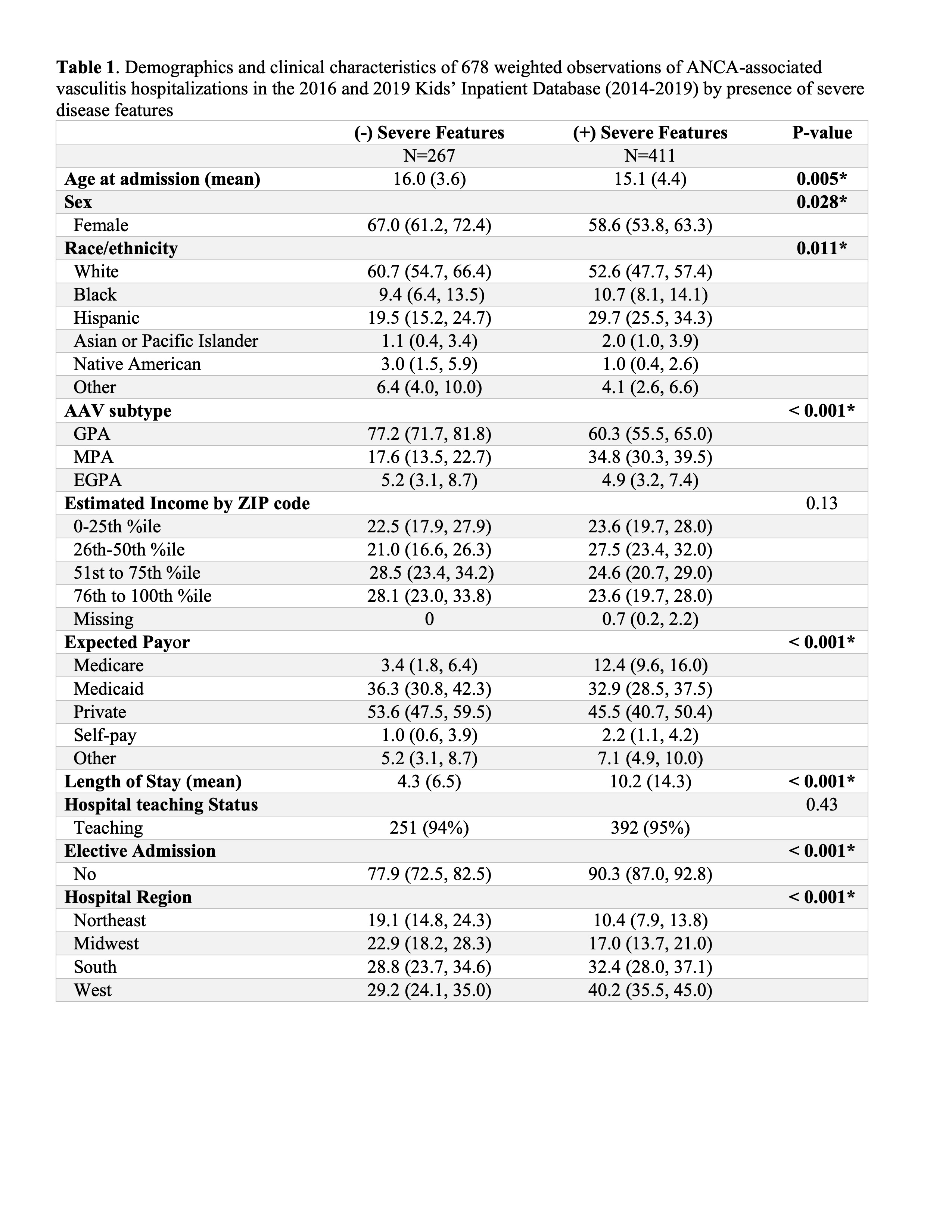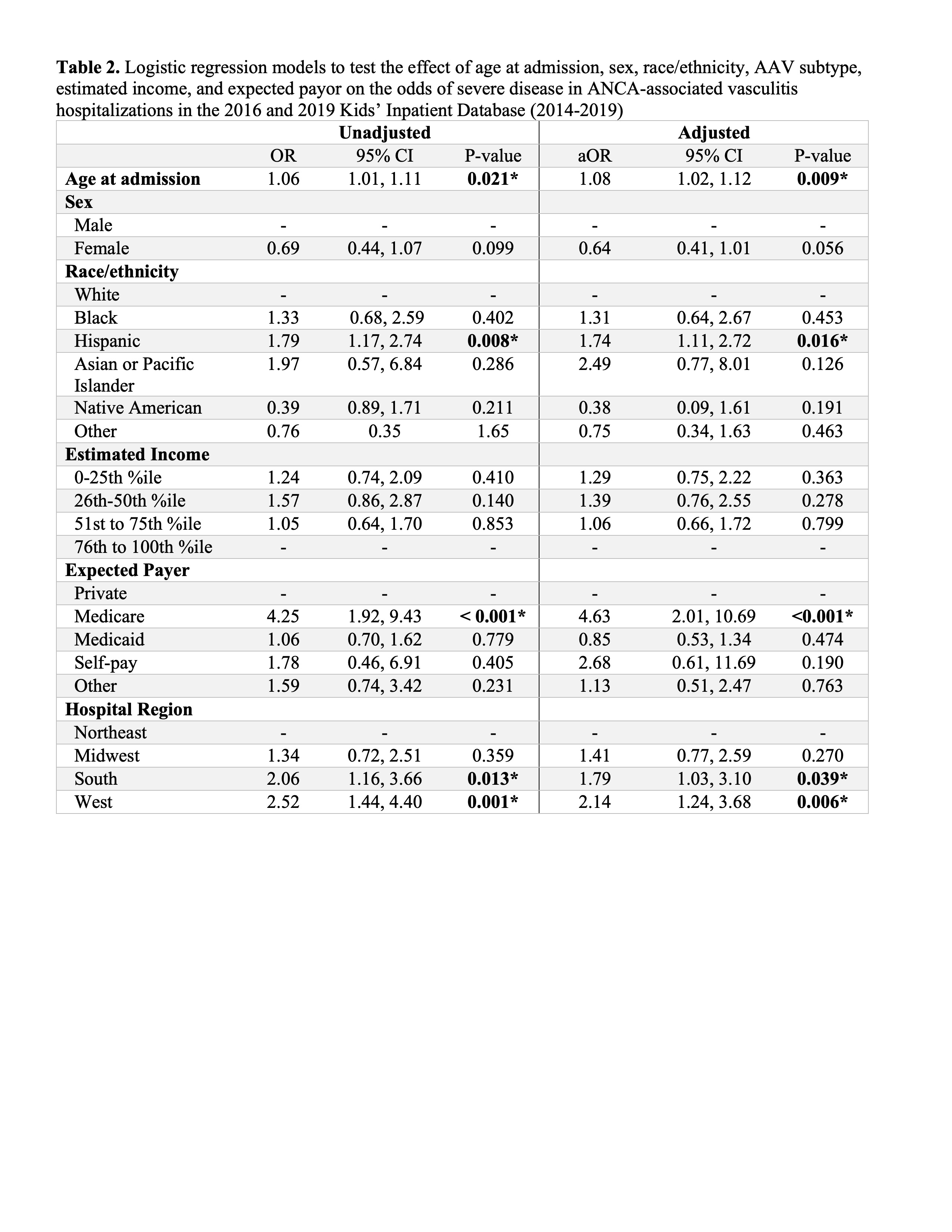Session Information
Session Type: Poster Session C
Session Time: 10:30AM-12:30PM
Background/Purpose: Race and ethnicity are societal constructs that contribute to health disparities. Small studies have found that Hispanic patients with ANCA-associated vasculitis (AAV) are more likely to present with severe features and complications, suggesting a relationship between race/ethnicity and severity of disease. However, racial/ethnic diversity is lacking in larger pediatric cohorts, a struggle that is pervasive in clinical research. The purpose of this study was to examine the association between race/ethnicity and disease severity in a nationally representative and diverse sample of pediatric patients hospitalized in the United States (US).
Methods: This cross-sectional study used the Kids’ Inpatient Database (KID), the largest publicly available, claims-based pediatric inpatient database in the US, to identify patients with granulomatosis with polyangiitis (GPA), microscopic polyangiitis (MPA), and eosinophilic granulomatosis with polyangiitis using ICD-10 codes. The primary outcome of interest was severe disease feature(s), the presence of which was tested as a dichotomous variable using univariate and multivariable logistic regression models adjusted for age, sex, race/ethnicity, estimated income quartile, hospital teaching status, elective/non-elective admission, insurance, and/or hospital region). Severe features were defined as illness in organ systems (e.g., acute kidney injury), complications (e.g., pulmonary hemorrhage), and interventions (e.g., plasmapheresis). Discharges with missing race/ethnicity were excluded.
Results: 678 weighted AAV discharges were identified from 2014-2019 (Table 1). The sample was racially and ethnically diverse with 10% of the discharges being for Black patients and 26% for Hispanic patients. Subjects with severe features had a 2.5-fold higher mean length of stay at 10.2 days (±14.3) compared to 4.3 (±6.5) days in those without (p< 0.001). 411 subjects (60.6%) had at least one severe disease feature. Race/ethnicity was significantly associated with severe disease in Hispanic as compared to White subjects, in both unadjusted (OR 1.79, 95% CI: 1.17,2.74) and adjusted analysis (adjusted OR [aOR] 1.74, 95% CI: 1.11-2.72) (Table 2). Additional covariates associated with severe features included younger age at admission, Medicare as compared to private payor, and hospitals in the South and West as compared to Northeast, in adjusted analysis (Table 2).
Conclusion: To our knowledge, this is the first large, nationally representative study that has found an association between AAV disease severity and race/ethnicity among pediatric subjects hospitalized in the US. Patients identifying as Hispanic had higher odds of severe disease, as well as patients whose primary payor was Medicare and hospitals in the South and West. These findings suggest not only disparities in care among historically marginalized racial/ethnic groups, but also those who rely on government medical assistance, and those who live in certain geographic regions. Future studies should focus on boosting the recruitment of these groups in prospective cohort studies in order to identify, better understand, and mitigate the effects of health care disparities.
OR = odds ratio; CI = confidence interval; aOR = adjusted odds ratio; AAV = ANCA-associated vasculitis.
Specific examples of severe features: respiratory (acute respiratory failure, acute respiratory distress syndrome, respiratory arrest); pulmonary hemorrhage; cardiac (heart failure, myocardial infarction); cardiovascular (hypotension, shock); renal (acute kidney injury); hepatic (acute hepatic failure, hepatitis); hematologic (defibrination syndrome, thrombocytopenia); metabolic (lactic or metabolic acidosis); sepsis; neurologic (acute encephalopathy, coma); stroke; need for plasmapheresis, invasive mechanical ventilation, non-invasive mechanical ventilation, renal replacement therapy, extracorporeal membrane oxygenation.
To cite this abstract in AMA style:
Valdovinos R, Soulsby W, von Scheven E. Race/ethnicity Is Associated with Disease Severity in Pediatric Patients with ANCA-associated Vasculitis Hospitalized in the United States [abstract]. Arthritis Rheumatol. 2024; 76 (suppl 9). https://acrabstracts.org/abstract/race-ethnicity-is-associated-with-disease-severity-in-pediatric-patients-with-anca-associated-vasculitis-hospitalized-in-the-united-states/. Accessed .« Back to ACR Convergence 2024
ACR Meeting Abstracts - https://acrabstracts.org/abstract/race-ethnicity-is-associated-with-disease-severity-in-pediatric-patients-with-anca-associated-vasculitis-hospitalized-in-the-united-states/


